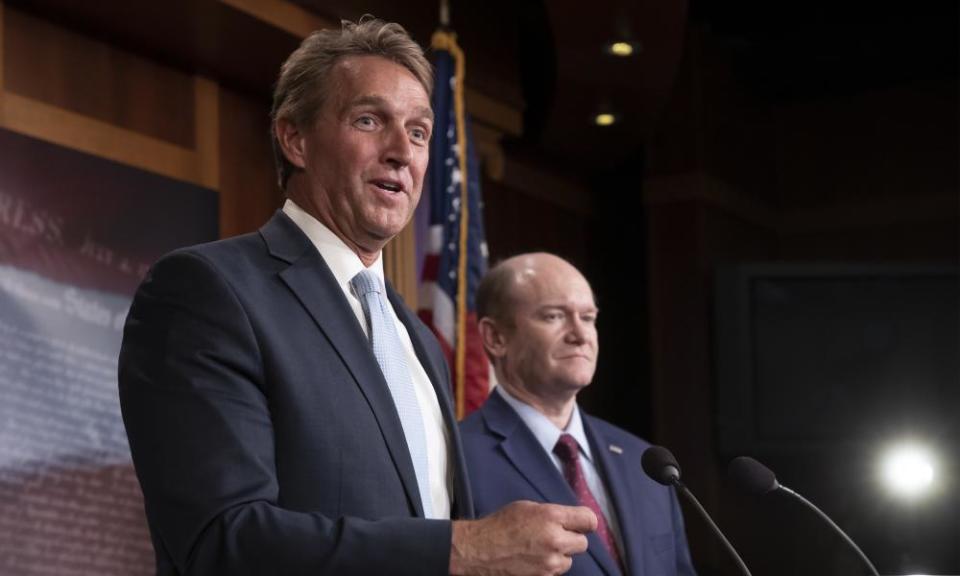Jeff Flake threatens to block judicial appointments over Mueller inquiry bill
Arizona senator furious at refusal to allow vote on bill
Legislation would protect special counsel’s Russia investigation

Donald Trump faces a potential roadblock to his appointment of rightwing judges to federal courts after the retiring Republican US senator Jeff Flake threatened to withhold support from judicial confirmations unless his bill to protect special counsel Robert Mueller’s investigation into Russia collusion is allowed to proceed.
Flake issued his threat after his bipartisan bill to protect the Mueller investigation, drafted alongside the Democratic senator Chris Coons, received a frosty reception from the Republican leadership. The Senate majority leader, Mitch McConnell, refused to allow a vote on the bill because, he said, he could see no such threat to Mueller’s inquiry that is investigating whether the Trump campaign colluded with Russia during the 2016 presidential race.
Flake responded furiously, saying: “Why are we so sanguine about this? Why do we protect a man who seemingly is so incurious about what Russia did during the 2016 elections?”
The senator from Arizona has the potential to cause considerable trouble for Trump until he stands down from his seat on 3 January. In the lame-duck Senate, the Republicans continue to enjoy the slimmest of margins, 51 to 49, meaning that if Flake goes ahead with his threat to block nominees Vice-President Mike Pence would be forced to cast his vote to force confirmations through.
A hiatus in the appointment of federal judges would be a blow to Trump as packing the courts with rightwingers has been one of the signature acts of his presidency so far. He bragged about the rate at which he had confirmed new judges at his rallies during the midterm election campaign.
Flake’s final stand is likely to further irritate the already agitated mood of the US president in the wake of Republicans’ patchy performance in the midterm elections, his ugly contretemps with France following his visit to Paris last weekend and the ongoing Mueller inquiry that is likely to flare up again now that election season is over. On Thursday morning Trump went on another Twitter foray in which he claimed the Mueller team had gone “absolutely nuts”.
The inner workings of the Mueller investigation are a total mess. They have found no collusion and have gone absolutely nuts. They are screaming and shouting at people, horribly threatening them to come up with the answers they want. They are a disgrace to our Nation and don’t...
— Donald J. Trump (@realDonaldTrump) November 15, 2018
Minutes later he leveled the harshest criticism that exists in Trumpland at Mueller – pointing out that he worked for President Obama for eight years.
....care how many lives the ruin. These are Angry People, including the highly conflicted Bob Mueller, who worked for Obama for 8 years. They won’t even look at all of the bad acts and crimes on the other side. A TOTAL WITCH HUNT LIKE NO OTHER IN AMERICAN HISTORY!
— Donald J. Trump (@realDonaldTrump) November 15, 2018
Mueller, who is a Republican, was appointed as director of the FBI by the Republican president George Bush in 2001. When Obama succeeded Bush he kept Mueller on in that position until he stepped down in 2013 having become the longest-serving FBI director since J Edgar Hoover.
Flake and Coons introduced the Special Counsel Independence and Integrity Act with the support of other senators from both main parties earlier this month. It would ensure that Mueller could only be fired for “good cause” by a senior justice department official, with the justification put in writing.
It would also set up a 10-day period in which Mueller could call for a judicial review by a panel of judges to check whether the dismissal had indeed been for “good cause”.
The proposed legislation was given renewed urgency by Trump’s decision to sack the US attorney general, Jeff Sessions, on 7 November and replace him with Matthew Whitaker who in the past has been openly critical of the Russia investigation and called for it to be whittled down. Democratic leaders have been applying pressure on Whitaker to recuse himself as the new DoJ official in charge of the Mueller inquiry on grounds of conflict of interest given his previous remarks about defunding and restricting the special counsel’s investigation.

